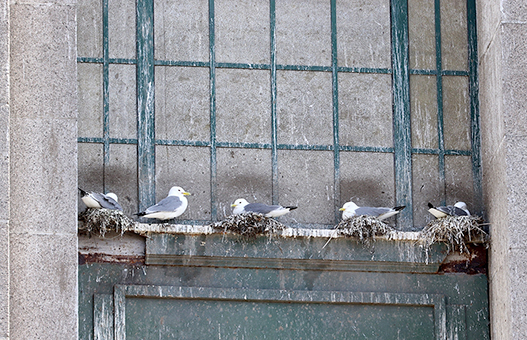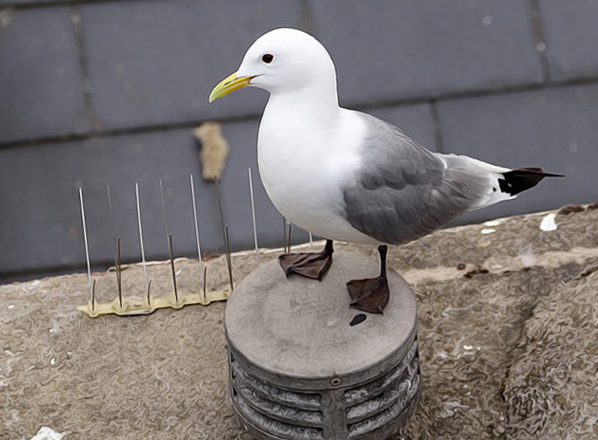North Shields – Tyne Kittiwakes
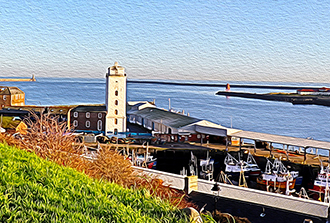 Ferry Mews & Smith’s Dock
Ferry Mews & Smith’s Dock
Tyne Kittiwake Colonies
Kittiwakes were first discovered nesting along the river Tyne in the town of North Shields in 1949 by John Coulson. John found pairs nesting on the old Brewery Bond Warehouse. At its peak this colony climbed up to around one-hundred pairs of Kittiwakes.
“Once upon a Tyne, in the fishing town of North Shields”
Later in life, John invested a great deal of his time researching Kittiwakes and you can read about his extensive work in his book ‘The Kittiwake by John C Coulson‘. Sadly, in 2000, the Brewery Bond building was netted, prior to being converted into modern apartments. A collection of remaining pairs, continued to nest nearby on the Ferry Mews building, adjacent to the Ferry Landing.
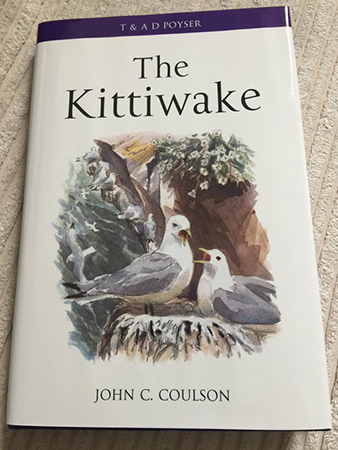
The Kittiwake – by John C Coulson
Published 2011 – T & AD Poyser
- An essential companion for all academics studying seabirds,
colonial species and especially Kittiwakes. - Beautifully illustrated and features photos of our well-loved Tyne Kittiwakes
Elsewhere in North Shields, Kittiwakes nested for a time on the
Lifeboat House, where ledges were added in the 1990s to help support the small colony. Up to three dozen nests rose and the Kittiwakes settled down. Unfortunately, like many of the buildings, the Tyne Kittiwakes have adopted themselves to nest over the years, this did not turn out to be a ‘forever home’ and the Lifeboat House itself was eventually demolished.
Opposite the river, in the town of South Shields, which also sits at the mouth of the River Tyne, Kittiwakes were also evicted from the McNulty Offshore Yard, Tyne Dock, where there was a colony of up to 55 pairs. An alternative nesting structure was built and provided, following the destruction of the McNulty building; which was considered to be in poor condition. Up to fifty-Five pairs nested in 2012 on the McNulty building; but there were Zero pairs from 2015 as the Kittiwakes themselves didn’t nest on the alternative structure which had been thoughtfully provided as compensation for the loss of their original nesting site; the McNulty building.
“ Why did the Tyne Kittiwakes choose NOT to nest on the artificial structure that was provided for them?”
In the present day up to twenty-four pairs continue to settle on the Ferry Mews, which itself is facing pressures, which could in the end cause the eviction AGAIN of this important small colony, where the story of the Tyne Kittiwakes all began.
“ Kittiwakes have been nesting along the River Tyne since the 1940’s,
which is longer than most of us have been alive. They are part of Tyneside’s Local History and Heritage”
Tyne Kittiwakes – Ferry Mews in North Shields, North Tyneside. – by Andrew Clayton
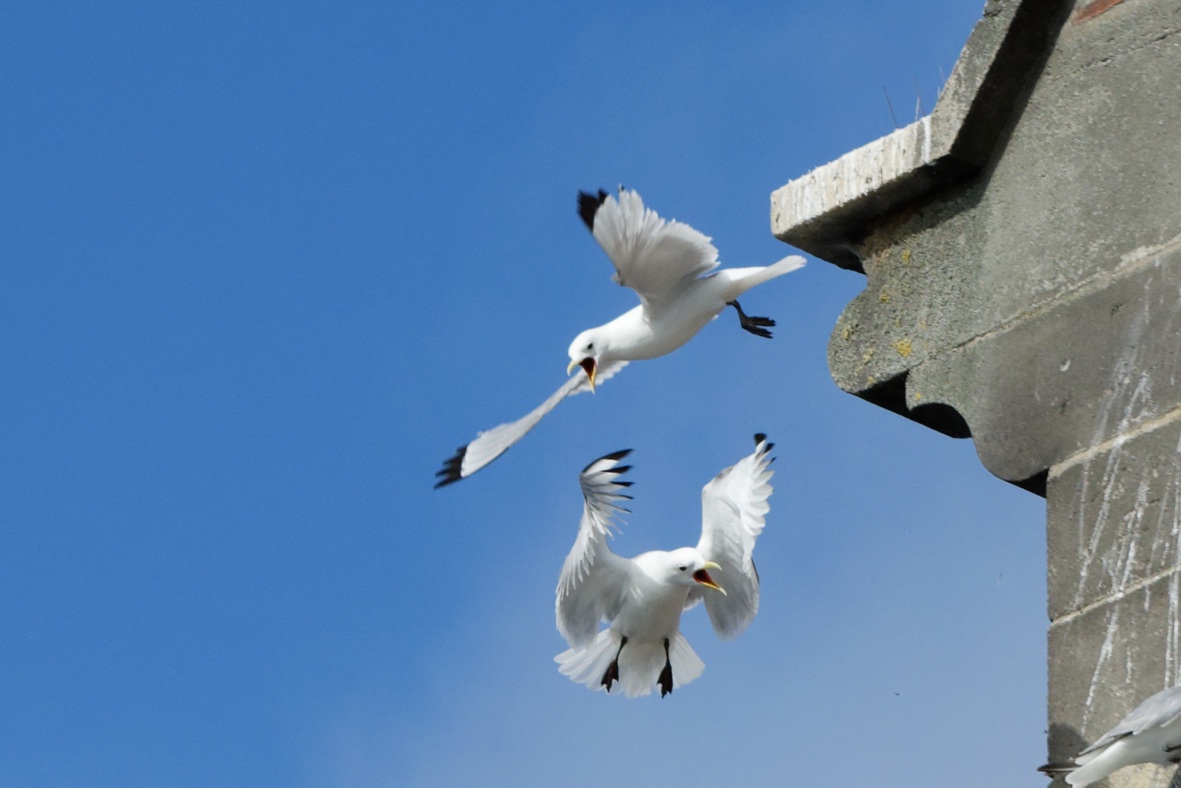
As 2021 dawned, the owner of the Ferry Mews building installed anti-bird netting, over the area where the colony had nested in previous years. This happened only a few weeks before they were due to return from their winter far out to sea; therefore, there was no time to look at alternative nesting sites.
“Kittiwakes can become trapped
in anti-bird netting;
sadly at times fatally.”
Between the 2021-23 seasons at least four Kittiwakes became trapped in anti-bird netting on the Ferry Mews building, with some so badly injured/in shock they didn’t make it through the night despite rescue attempts.
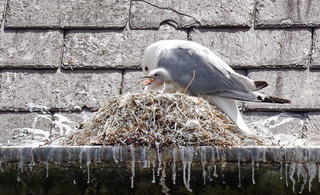
A Tyne Kittiwake
with a chick on
Ferry Mews in North Shields
by Andrew Clayton
These trappings so far seem more related to areas of older netting that is also present on the top of the building. Lots of thanks go to
» Blyth Wildlife Rescue and the local Fire Service for helping with any rescues.
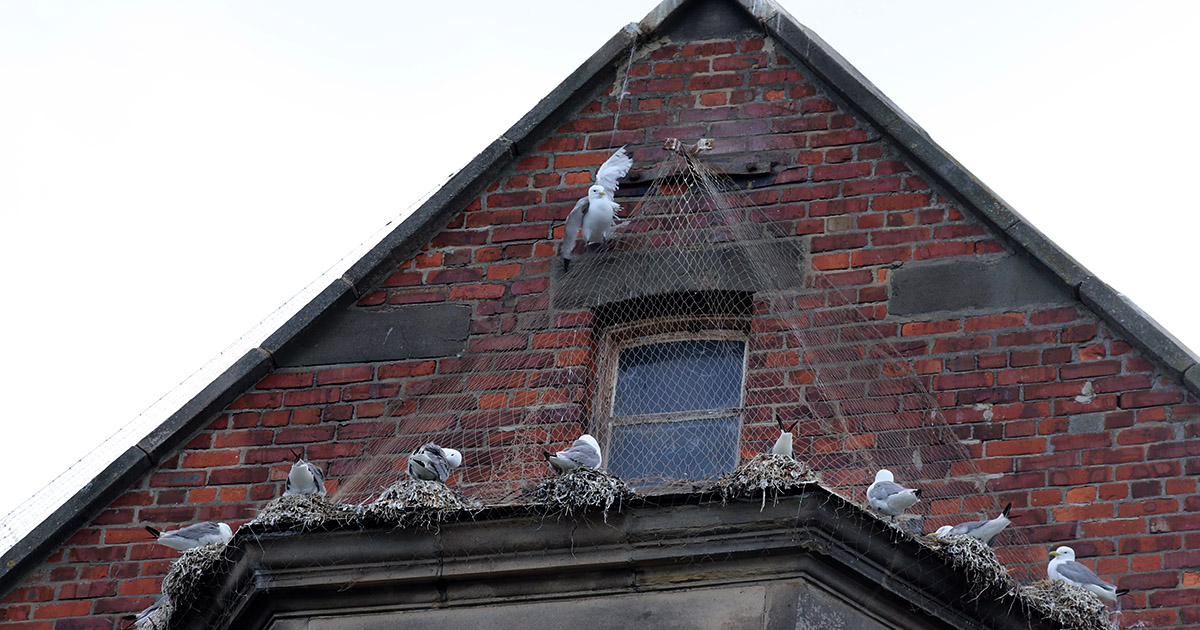
Petition – change.org
Daniel Turner started a petition to try and encourage the owner of the building to remove all the anti bird netting. Despite all his efforts the netting still remains.
A Tyne Kittiwake trapped in anti bird netting on the Ferry Mews in North Shields by Paul Buskin
Please help support Dan Turner and sign the petition at » change.org regarding the campaign to help save the
North Shields colony. As the netting ages, it becomes more of a hazard to birds. Once it becomes damaged, it is then not possible to carry out repairs if Kittiwakes are nesting nearby during the spring/summer months ; so further Kittiwakes can become trapped. The anti-bird netting can act like a large spider web and whilst it remains it is a hazard to wildlife, especially birds.
A Tyne Kittiwake nesting on anti-bird netting –
Ferry Mews in North Shields by Paul Buskin
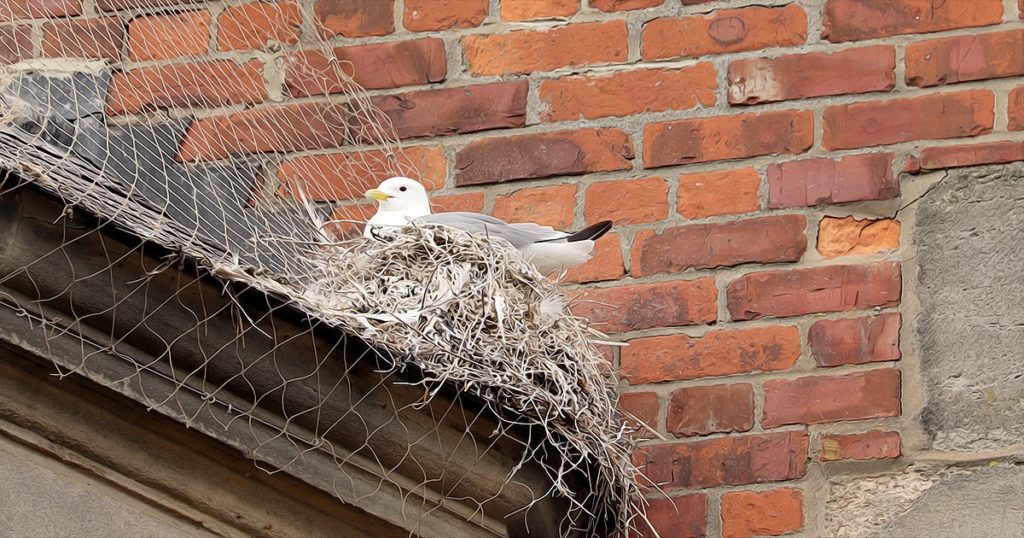
“ What did the Kittiwakes think?”
Kittiwakes continue to nest
in North Shields
Despite the introduction of new anti-bird netting, which now covers the area where the colony have nested in previous years; Kittiwakes nested during the 2021-23 breeding seasons and successfully raised young chicks with
up to 24 pairs nesting in North Shields on the Ferry Mews building.
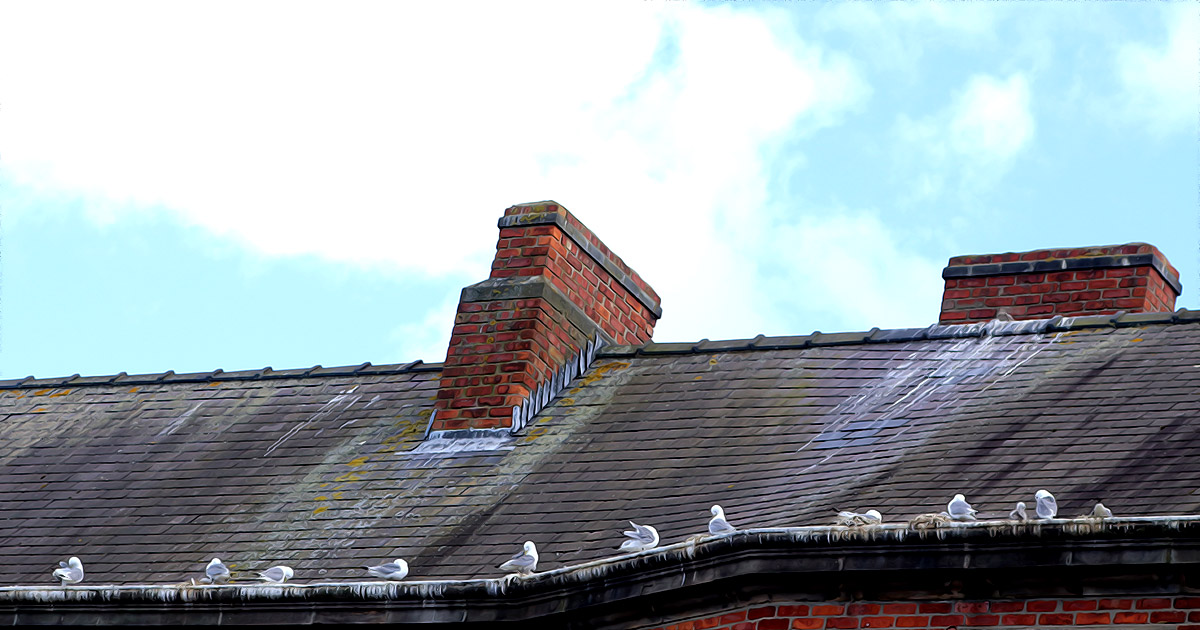
Tyne Kittiwakes nesting in the guttering on the roof of the Ferry Mews in North Shields by Paul Buskin
The anti-bird netting on the Ferry Mews Building in North Shields may have NOT STOPPED the Kittiwakes from nesting; however it has encouraged the colony to spread out along the roof of the building. Pairs are nesting along the guttering over the past three seasons. So this new anti-bird netting is wasteful and whilst it remains, it continues to be a potential hazard to the local wildlife.
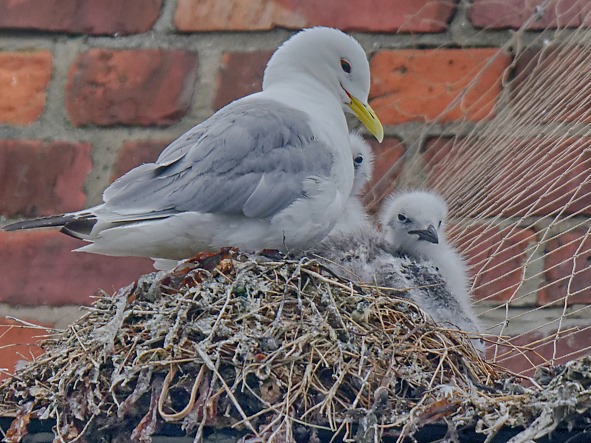
An adult Kittiwake with chicks on the Ferry Mews building
in North Shields, North Tyneside by Andrew Clayton.
An article was published in a national newspaper; the
» Guardian
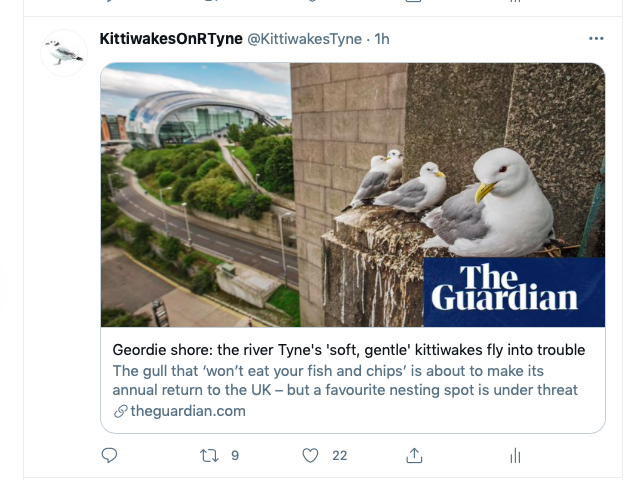
2024 Season
As the pages of the Story of the Tyne Kittiwakes turned for another season, a sad chapter is beginning in North Shields, North Tyneside. Where dozens nested on the Front of Ferry Mews; only a couple remained. Fewer pairs also returned to nest in the guttering; with 3 pairs settling down on building next door.
Where up to 23 pairs nested during the 2023 season, only 16 were present in 2024. This reduction is likely due to a combination of the owner of the building adjusting the anti-bird netting and how Kittiwake colonies closer to the coast are more vulnerable to avian-flu as they come in closer contact with other species of seabirds.
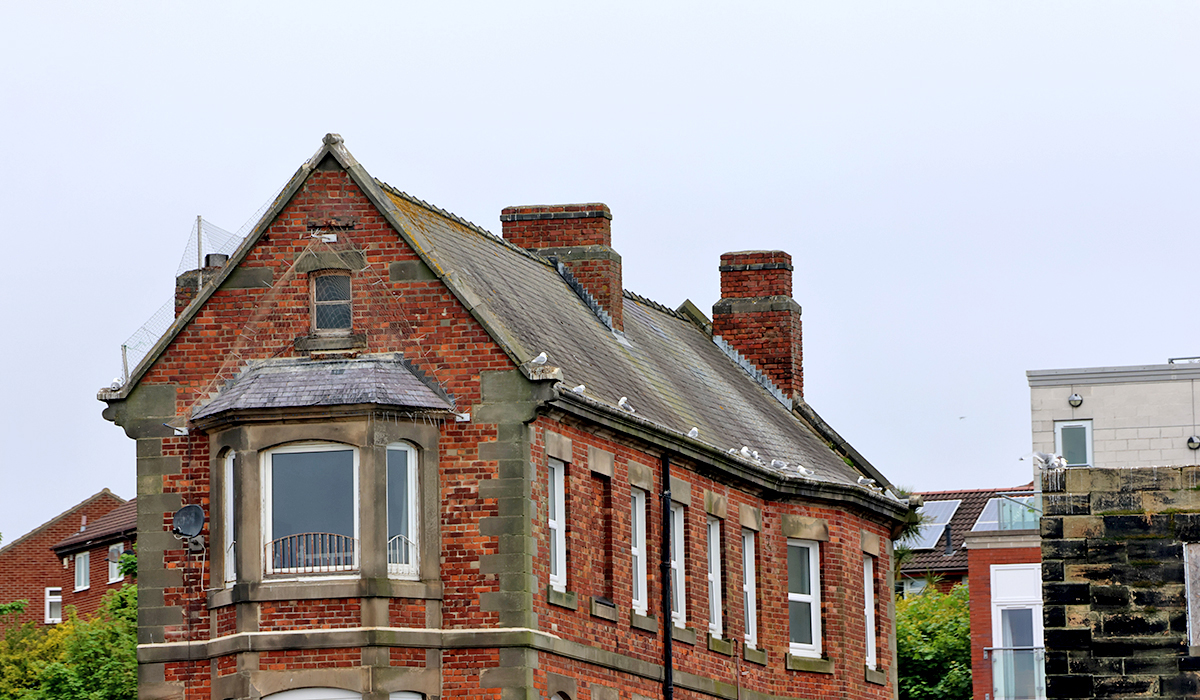 Ferry Mews in North Shields, North Tyneside.
Ferry Mews in North Shields, North Tyneside.
Smiths Dock in North Shields
During the 2021-2023 seasons Kittiwakes spent time around Smiths Dock in North Shields, close to the Ferry Landing. Access is more limited to this site. At this location the Kittiwakes have started to build their nests quite low down and are more exposed to predators. They have been gathering however in groups of 50-100 at times. Nesting pairs are less than a dozen, however this is expected to grow in the coming years.
“ Up to five pairs nesting during the 2023 season,
but sadly they failed to successfully raise any chicks that year”.
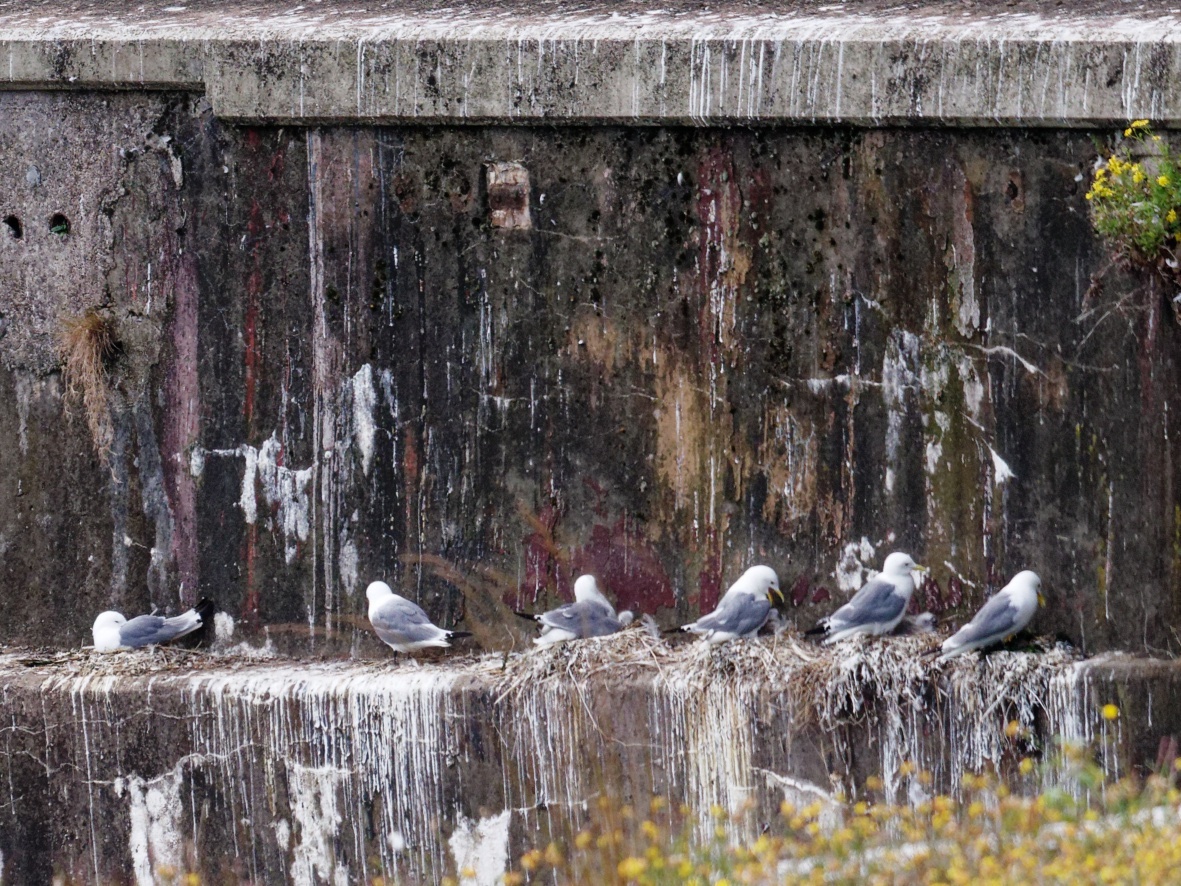 Kittiwakes nesting at Smith Dock in North Shields during 2022, by Andrew Clayton
Kittiwakes nesting at Smith Dock in North Shields during 2022, by Andrew Clayton
2024 Season
No pairs returned to nest at Smiths Dock for the 2024 season. This may be as a consequence of several seasonal tides which were much higher than normal; with a few instances where flood preventative measures were activated by the environment agency.
Old Low Light – North Shields, North Tyneside.

Bringing People together from North Shields and beyond. The home of fabulous wildlife walks with David Hirst.
Explore the wildlife wonders of the mouth of Tyneside’s Big River; The River Tyne.























